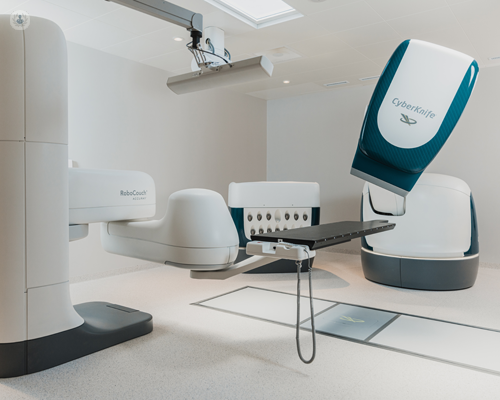Pelvic radiation disease
Dr Vikram Sharma - Gastroenterology
Created on: 07-03-2019
Updated on: 06-29-2023
Edited by: Karolyn Judge
What is pelvic radiation disease?
Pelvic radiation disease (PRD) is a set of symptoms that can affect patients who have undergone radiotherapy treatment for abdominal or pelvic cancers. This may include:
- cervical cancer;
- uterine cancer;
- bowel cancer, and;
- prostate cancer.
Having such treatment on this part of the body can treat the cancer present, however, it can also produce longer-term symptoms and side effects, such as diarrhoea or constipation, rectal bleeding, bloating, abdominal pain, increased urgency to pass urine, difficulty passing urine or difficulty during sexual intercourse. Symptoms can range in severity.

What's the outlook for pelvic radiation disease?
The prognosis of pelvic radiation disease varies. Whilst the symptoms can vary, with some clearing up on their own, others can persist and affect daily activities for years after radiotherapy treatment has finished. A lot of the symptoms caused can be challenging to live with and cause some embarrassment, making some patients feel frustrated and hopeless.
Learn more about supporting people living with PRD on the Pelvic Radiation Disease Association website.
What are the long term side effects of pelvic radiation?
Alongside changes to your bowel habits and bladder inflammation, long-term side effects of pelvic radiation include:
- fine cracks in the pelvic bones;
- a vitamin B12 deficiency;
- bleeding from the bowel, bladder or vagina;
- tingling, loss of sensation or weakness in one or both legs, known as radiotherapy induced lumbosacral plexopathy (RILP) which is quite rare;
- weakened pelvic bones.
What are the symptoms of pelvic radiation disease?
Symptoms of pelvic radiation disease can sometimes first appear during radiotherapy treatment, however, others might not appear until much later on, sometimes even years after radiotherapy treatment has finished. This is called Late Effects Pelvic Radiation Disease. The symptoms will vary depending on which organ is affected.
Reproductive organs:
- Vaginal dryness
- Loss of libido
- Painful intercourse
- Erectile dysfunction
Bowel:
- Bowel incontinence
- Chronic diarrhoea
- Bacteria overgrowth
- Constipation
- Abdominal pain
- Rectal bleeding
Bladder:
- Weakened pelvic floor
- Urinary incontinence
- Blood in the urine
How is PRD diagnosed?
As a lot of the symptoms of pelvic radiation disease can be symptomatic of other conditions, these must first be ruled out by diagnostic tests and medical history. If the patient has bowel symptoms, they may be given an endoscopy of their large bowel and an MRI scan of their small bowel. They may also have their stool tested to check for any infections. If the patient has bladder symptoms, it's likely they will be offered a cystoscopy to assess the bladder and urine tests as well.
What are the causes of pelvic radiation disease?
Pelvic radiation disease results from side effects of radiotherapy treatment for cancer. During radiotherapy treatment, whilst cancer cells are destroyed, surrounding healthy tissue cells can also be damaged.

Can pelvic radiation disease be prevented?
If a patient has a type of cancer that requires radiotherapy treatment in order to treat it, then this type of treatment cannot be avoided. There is ongoing research into how the effects of radiotherapy on the pelvic organs can be reduced.
How is pelvic radiation disease treated?
Treatment of pelvic radiation disease will depend on the organ affected and the symptoms experienced.
Reproductive organs:
To help manage problems such as vaginal dryness, painful intercourse or symptoms of early menopause, patients may be prescribed hormone creams, dilators or hormone replacement therapy. For men who have erectile problems, they will likely be referred to a specialist for further treatment options.
Bowel:
Medications can be prescribed for diarrhoea, constipation or bile acid malabsorption. If changes to diet are deemed helpful, the patient may be referred to a dietician. To help with bowel incontinence issues, pelvic floor muscle strengthening exercises can be helpful.
Bladder:
Urinary incontinence issues can be helped with pelvic floor exercises. If passing urine is a symptom, then special dilators can help to widen the urethra.
Which type of specialist treats pelvic radiation disease?
Pelvic radiation disease can be managed by several different specialists, depending on the symptoms experienced. However, treatment can involve gastroenterologists, gynaecologists, urologists, GPs or dieticians.



